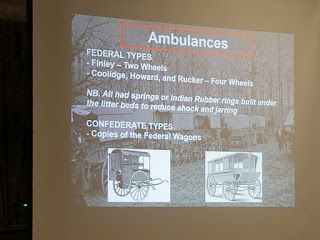The Dragoons held their monthly camp meeting on Thursday March 11th at the Masonic Lodge in downtown Prattville. There were approximately two dozen members and guests in attendance. Chaplain Brantley opened the meeting with an Invocation followed by Color Sgt Dennis leading everyone in the pledge to the US flag and salutes to the Alabama state and Confederate flags. Commander Waldo read the SCV Charge and then provided announcements and upcoming events. Col. Jayson Altieri was the speaker and presented a very professional and fascinating discussion of medical treatment and the ambulance services during the War Between the States. The meeting closed with the recitation of the SCV Closing and a Benediction by the Chaplain.
Jayson provided somber statistics from the WBTS where Union soldiers had a 15% chance of dying if involved in battles and Confederates soldiers had a 12% chance of dying. These fatality figures were worse for soldiers injured on the battlefield and the best case was for soldiers to have a friend by their side in battle who could be trusted to provide care should they fall including evacuating wounded from the battlefield. There were also many casualties due to disease outside of wounds incurred in skirmishes. Jayson provided an accounting of Confederate Sgt. Richard Kirkland, the Angel of Marye's Heights, who provided water to injured Yankee and Confederate soldiers on the battlefield at Fredericksburg.
At the Battle of Malvern Hill in 1862 where Gen. Robert E. Lee led his Confederate forces against the Union Army of the Potomac under Gen. George B. McClellan, injured soldiers had to walk twenty miles back to Richmond and Washington DC to hospitals, the sight of which led to a public outcry for better care for the wounded. The 45 cal bullets used in the WBTS utilized soft lead and would expand on entry into the body, causing extensive injury, destroying flesh and bones and carrying filthy cloth from the uniform into the wound exacerbating the risk of infection. These lead bullets were subsequently outlawed by international convention due to the severity of the injuries but, cannon balls and shrapnel and grape shot caused severe injuries for soldiers also. Amputations were somewhat common and actually enhanced the chance of survival from these severe injuries.
The Federal blockade of Southern ports kept medicines from reaching Confederate troops including for example quinine used for preventing malaria. Substitutes using herbs and alternate ingredients were employed such as lard mixed with honey mixed with herbs as a wound salve providing restorative antibodies. Jayson provided an 18th century reference book as an example of these herbal remedies used in the colonies and frontier and the WBTS, "Everyman His Own Physician Being a Complete Collection of Efficacious and Approved Remedies for Every Disease Incident to the Human Body with Plain Instructions for Their Common Use".
The Battles of Manassas and Malvern Hill and the public observation of the wounded streaming from the battlefields led to a demand for assistance for the casualties, The formation of ambulance corps incorporating best practices from the battlefield medicine innovated by French Baron Dominique Jean Larrey resulted. The Lieber Code dictated that non-combatants would not be harmed as they cared for the wounded on the battlefield. Red arm bands were used to designate those in the ambulance and medical corps. Two and four wheeled wagons were used as ambulances to transport litters of 4-6 soldiers or more ambulatory injured. Confederate ambulances were copied or captured examples of Federal wagons. Another development from the WBTS regarding medical care was the organization of a Sanitary Commission to ensure cleanliness of hospitals.









No comments:
Post a Comment